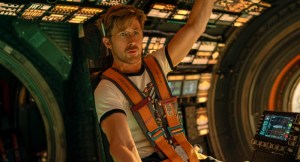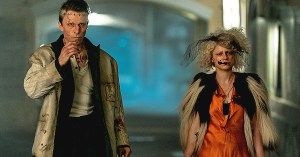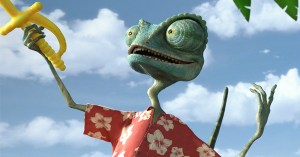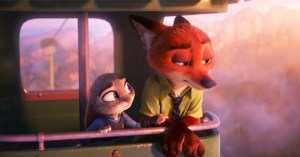Total Recall: Train Movies
With Unstoppable hitting theaters, we run down some of the best in locomotive cinema.
We don’t see them produced as often as we used to, but Hollywood has been making movies about trains since the dawn of cinema. It’s a long, rich tradition that stretches back to the silent era, so when we saw that Tony Scott and Denzel Washington’s latest collaboration, Unstoppable, was an action thriller about a killer runaway train loaded with nuclear explosives… well, naturally, we decided to dedicate this week’s Total Recall to some of the most noteworthy entries in the long list of railroad movies. At a mere dozen entries, this chronologically-arranged list is obviously far from complete, but we think you’ll find some of your favorites (and at least one unnecessary sequel). Which movies would you add? Let us know in the comments!
The Great Train Robbery
Though it’s probably the shortest film ever to get the Total Recall treatment, the 12-minute The Great Train Robbery may also be the most influential: not only did it establish a new benchmark for narrative filmmaking, but it also utilized a number of new techniques, including cross-cutting, double exposure, and shooting on location. Accomplishing in just a few minutes what many films fail to do in two hours, Robbery established our lengthy cinematic love affair with the railroad; it was, as Dennis Schwartz of Ozus’ World Movie Reviews wrote, “The most widely viewed picture of its time.”
The General
1927’s The General found Buster Keaton taking his peerless physical comedy to a more ambitious level, dramatizing a legendary Civil War raid with some of the most dangerous, complicated, and expensive stunts of the silent film era. An unmitigated critical and commercial disaster at the time of its release, The General was one of Keaton’s biggest disappointments, but it was really just a movie ahead of its time; in the years since, it’s made numerous top critics’ Best Movies lists, made the top 20 in the AFI’s “100 Years…100 Laughs,” and been enshrined in the National Film Registry. It is, in the words of the Chicago Reader’s Dave Kehr, “An almost perfect entertainment.”
Strangers on a Train
Trains were a recurring theme in Alfred Hitchcock’s work, popping up as plot devices (The 39 Steps and North by Northwest) or even almost characters unto themselves (The Lady Vanishes). For the purposes of this list, however, we’re climbing aboard 1951’s Strangers on a Train, Hitch’s troubled adaptation of the Patricia Highsmith novel. From the script’s tortured birth to the director’s battles with Warner Bros. over casting, nothing seemed to come easily during Strangers‘ production, and early reviews were lukewarm — but almost 50 years later, it’s regarded as one of the master’s finest works, both as a smart adaptation of the book and as a rich, subtext-heavy thriller. “Two men, a problem, and a crime is an old theme,” wrote Mark Athitakis for Filmcritic.com, “but the list of works that exploit it perfectly is a short one. Strangers on a Train belongs on it.”
Murder on the Orient Express
Sidney Lumet lined up an all-star cast for this adaptation of the 1934 Agatha Christie novel, and although Christie famously felt Albert Finney lacked a splendid enough mustache to play Hercule Poirot, 1974’s Murder on the Orient Express still steamed its way to six Academy Award nominations (including a Best Supporting Actress win for Ingrid Bergman) and heaps of critical acclaim. Packed with old-fashioned intrigue and bolstered by the talents of Lauren Bacall, Sean Connery, John Gielgud, and Vanessa Redgrave — not to mention Finney and Bergman — Express earned the admiration of the New York Times’ Vincent Canby, who appreciated the way it “recalls that innocent, pre-Amtrak time when the Orient was still mysterious and railroad travel was full of exotic possibilities.”
The Taking of Pelham One Two Three
The 2009 remake offers serviceable, slick action thrills, but for the grittiest, sweatiest train movie of them all, you’ve got to go back to the original Taking of Pelham One Two Three. Released in 1974, it’s the story of a grizzled New York Transit Authority cop (Walter Matthau) forced to defuse a hostage crisis when a gang of criminals (led by Robert Shaw) commandeers a subway train and gives the authorities one hour to deliver a $1 million ransom. (Hey, it was a long time ago.) Taut, smartly written, and adroitly balanced between sharp dialogue and nifty set pieces, Pelham has come to be regarded as a somewhat overlooked classic of the era; it is, as William Thomas wrote for Empire Magazine, “The kind of gritty, relentless thriller that could only come from the ’70s.”
Silver Streak
The first of four collaborations between Richard Pryor and Gene Wilder, 1976’s Silver Streak stars Wilder as George Caldwell, a shy book editor whose plans for a boring L.A.-Chicago train ride go awry when he finds himself embroiled in a complicated (and rather deadly) plot to cover up the truth about a pair of forged Rembrandts. Just when poor George thinks he’s lucked into some railway nookie with a fellow passenger (Jill Clayburgh), he ends up the unwitting target of a gangster (Ray Walston) who has him tossed off the train — twice! — and he needs the help of an impeccably mustachioed crook (Pryor) to save the day (and the lady). It’s very silly, and just as uneven, but Silver Streak has more than enough inspired moments to make up for the bumpy spots; as David Nusair observed for Reel Film Reviews, “the entire film might just be worth a look for the sequence in which Pryor teaches Wilder how to be black.”
Runaway Train
What do you get when you take a train in the Alaskan wilderness, put an insane Jon Voight on it, give him Eric Roberts for a sidekick, and throw in a little Danny Trejo for good measure? The answer lies in this ‘80s action classic about a violent lunatic (Voight) who escapes from prison with the help of a dimwitted convict (Roberts) and ends up stowing away on a train that just happens to be on a collision course…with DEATH! Ahem. The cast and the premise suggest cheesy B-movie thrills, but Runaway Train boasts a surprisingly impressive pedigree — the script was based on a Kurosawa screenplay, and director Andrei Konchalovsky was still years away from succumbing to the nonsense of Tango & Cash. As Geoff Andrew wrote for Time Out, “Somehow one leaves aside the blatant implausibilities, the coincidences, even Eric Roberts, and takes great pleasure in a breakneck ride to the end of the line.”
Throw Momma from the Train
In 1987, Strangers on a Train received a darkly comedic update in the form of Throw Momma from the Train, a Danny DeVito directorial effort about a struggling writer (Billy Crystal) whose plagiarist ex-wife (Kate Mulgrew) is living large on the success of a book she stole from him, and the browbeaten middle-aged college student (DeVito) who cooks up a plan to get rid of her — as well as his own battle axe of a mother (Anne Ramsey). While far from a universal success with critics (the Washington Post’s Rita Kempley suggested filmgoers “throw the whole thing in front of a subway and hope it gets dragged for a couple of miles”), Throw Momma‘s blend of mordant humor and well-cast comic foils earned admiration from writers like Ken Hanke of the Asheville Mountain Xpress, who called it “A rather sweet little comedy masquerading as a black comedy.”
Under Siege 2: Dark Territory
It’s irredeemably silly — and it’s considered a disappointment even in the often painful context of the Steven Seagal filmography — but we’d be remiss if we didn’t tip our conductor’s cap to Under Siege 2: Dark Territory, the train-bound sequel to Seagal’s 1992 hit about Casey Ryback, a NAVY Seal-turned-chef with a John McClane-like propensity for crossing paths with maniacal villains. Having saved the world from a boat in Under Siege, Ryback hit the rails here, riding with his niece (Katherine Heigl) on a journey to visit the grave of her father; before they can get there, though, their train is hijacked by Travis Dane (a scenery-gobbling Eric Bogosian), who intends to earn a billion-dollar payday by using a space laser to blow up the East Coast. It’s no wonder there was never an Under Siege 3 — not yet, anyway — but this is the only movie on this (or any) list whose climax features the bad guy having his fingers cut off by a helicopter door. As the Arizona Daily Star’s Phil Villarreal shrugged in his begrudgingly positive review, “Run-of-the-mill Seagal. Could be better, could be worse.”
The Polar Express
Yeah, yeah, we know — Robert Zemeckis probably needs to step away from the mo-cap machine and give us a movie that doesn’t star dead-eyed animatrons. But in this cynical age, isn’t it worth something to have a film that believes so clearly in wonder — and goes to such great lengths to share that wonder with its audience? It may not be worth a great deal of critical goodwill, as evidenced by The Polar Express‘ underwhelming 56 percent on the Tomatometer, but between its $300 million theatrical gross, the Polar Express amusement park ride, and the general lack of modern Christmas movies for kids that aren’t thoroughly crass, it’s easy to understand why so many people agree with Tony Toscano of Talking Pictures, who praised it as “A warm fuzzy for the holidays.”
The Darjeeling Limited
People in the movies just don’t travel by train as much as they used to — unless, that is, they’re the sort of lovable eccentrics that populate Wes Anderson movies. For example: 2007’s The Darjeeling Limited, named for the train booked by Francis Whitman (Owen Wilson) to take himself and his brothers Jack (Jason Schwartzman) and Peter (Adrien Brody) on a trip across India. They haven’t seen each other since the death of their father a year previous, and their squabbling quickly makes it apparent why; in fact, it gets them kicked off the train, adding another surreal component to a journey that already had plenty of them. “Brothers and other strangers ride The Darjeeling Limited,” exhorted Carrie Rickey of the Philadelphia Inquirer, calling it “Wes Anderson’s captivating road movie that views life as a Great Train of Being.”
Transsiberian
An ensemble cast, a slowly unraveling mystery, and a railway journey where little is as it seems — Brad Anderson’s Transsiberian was released in 2008, but it’s stocked with timeless cinematic ingredients. And it makes smart use of them, too; the smartly twisted script, co-written by Anderson and Will Conroy, recalls themes that will be instantly familiar to anyone who’s seen a Hitchcock film (such as Strangers on a Train, perhaps?), but it isn’t slavishly derivative — and it’s solidly cast, with Woody Harrelson, Kate Mara, Emily Mortimer, Ben Kingsley, and Eduardo Noriega turning in superlative work. As Roger Ebert appreciatively noted, “Transsiberian starts in neutral, taking the time to introduce its characters, and then goes from second into high like greased lightning. I was a little surprised to notice how thoroughly it wound me up. This is a good one.”
Take a look through the rest of our Total Recall archives. And don’t forget to check out the reviews for Unstoppable.
Finally, here’s a great locomotive song from the King:






